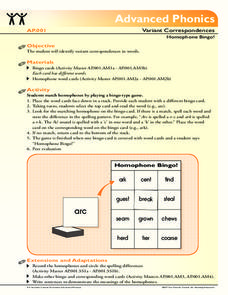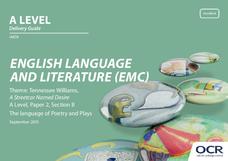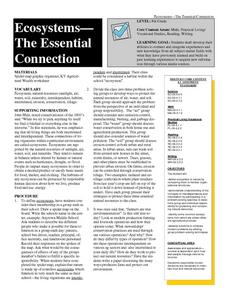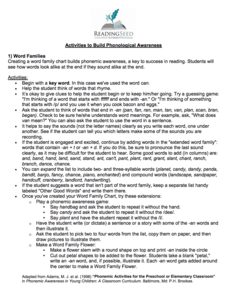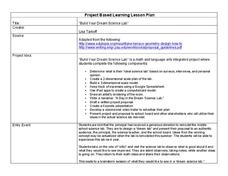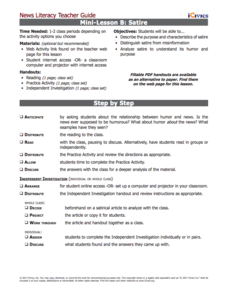Florida Center for Reading Research
Advanced Phonics: Variant Correspondences, Homophone Bingo!
Phonics doesn't just have to be a daily routine for class members. Spruce up their phonemic awareness with an exciting game of Bingo! Young grammarians select cards, locate their matching homophones, spell the pairs, and identify how...
OCR
A Streetcar Named Desire Delivery Guide
Instructors who want to use A Streetcar Named Desire as a core text need not rely of the kindness of other teachers to find engaging activities to support a study of Tennessee Williams' Pulitzer Prize winning drama.
Curated OER
Ecosystems-The Essential Connection
Students develop their abilities to solve problems both in school and in a variety of situations similar to that they have encountered in life. They define the term ecosystem in nature by comparing them to familiar organizational...
Pulitzer Center
"Voices from Haiti": Using Poetry to Speak up for a Cause
Explore a real world use of poetry with your class! Young language arts pupils consider the concept of advocacy and how journalism, photography, and poetry can raise awareness for a cause. They read several poems about individuals...
McGraw Hill
Study Guide for Island of the Blue Dolphins
Dive your class into a reading of Island of the Blue Dolphins with this in-depth study guide. Breaking the novel into three parts, the resource begins each section with a focus activity that identifies a specific theme or question to be...
Polk Bros Foundation
Comprehensive Nonfiction Reading Questions
Analyze any nonfiction text with the set of questions on this sheet. Class members practice inferring by noting the main idea and purpose of a passage. They also analyze an opinion in the passage and write a brief summary. See the...
Florida Center for Reading Research
Vocabulary: Morphemic Elements, Root-O!
Young readers get to the root of unfamiliar vocabulary with a collaborative learning activity. Given a deck of root word cards and copies of a graphic organizer, pairs of students take turns flipping over cards and brainstorming...
Florida Center for Reading Research
Vocabulary: Words in Context, Ask-Explain-List
Engage young readers in using context clues with this collaborative vocabulary activity. In pairs, children draw from a deck of cards, with each card asking a question about a context involving a specific vocabulary word. After...
Literacy Connects
Activities to Build Phonological Awareness
Begin your reading program each day with a mini lesson on phonological awareness using these engaging activities listed in the resource. Young ones will enjoy word families, clapping and counting syllables, identifying single sounds and...
Alpena-Montmorency-Alcona Educational Service District
4th Grade Personal Narrative
Throughout 10 lessons, fourth graders learn how to plan, organize, write, and edit their own personal narratives. In the beginning, young writers come up with ideas of personal experiences and the emotions linked with those experiences....
Curated OER
Affixes and Roots
Here is a skills practice sheet that instructs fourth graders to form words using affixes and root words. After reading 16 clues, individuals match an affix to a root word in order to create the word that best fits the clue.
Read Works
A Bird Came Down the Walk
"A Bird Came Down the Walk" by Emily Dickinson is the focus text of a narrative poetry-based reading comprehension worksheet. After reading her poem, young readers respond to seven multiple choice and three short answer questions. The...
K12 Reader
The Important Apostrophe: Their, They’re, and There
They're going to be there with their family. Class members practice using and identifying the correct use of they're, there, and their with a skills practice worksheet. The top half of the worksheet gives brief background information on...
K12 Reader
The Important Apostrophe: You're and Your
You're going to love a worksheet that teaches your class the difference between you're and your. Learners read a brief introduction explaining the two words and practice identifying the correct uses. Then, they read sentences and...
Read Works
Fireflies
A short story about a nighttime adventure at summer camp provides readers with a chance to practice their comprehension skills.
Turabian Teacher Collaborative
How to Find a Research Question
There are so many fascinating topics and concepts to learn about in the world. But where do you start? Begin formulating questions for an argumentative research paper with a guided practice instructional activity. After coming up with...
Turabian Teacher Collaborative
My Favorite Martian: Workshopping Warrants
Sometimes explaining an argument can lead to confusion and miscommunication. Narrow down the details in written arguments with a group activity in which learners pretend to be aliens from another planet, struggling to understand each...
Curated OER
Build Your Dream Science Lab
Would your ideal science lab be filled with bubbling beakers and zapping Tesla coils? Or would it contain state-of-the-art computer technology and data analysis? Dream big with an innovative lesson that connects math and language arts...
Read Works
Spring
Celebrate the season of spring with a poem. After reading a four-stanza poem about the season, sixth grade readers respond to 10 reading comprehension questions that have them thinking about the purpose, imagery, and other types of...
Read Works
Fireflies in the Garden
Imagine a dark sky lit up with fireflies. Robert Frost's "Fireflies in the Garden" instills a visual in the reader's mind of a star lit sky glowing with fireflies. After reading the poem, learners compare and contrast the image the poem...
Harper Collins
The Giving Tree Anniversary Teaching Guide
Celebrate poetry month all of April with a guide that uses six of Shel Silverstein's most famous books as a basis for the lessons. Discussion questions and writing activities are provided for each of Silverstein's books.
Read Works
Cool to Be Kind
Make a connection between empathy and bullying with a reading passage that has readers thinking about other people's feelings. After reading, learners respond to ten reading comprehension questions involving short answer and multiple...
K5 Learning
Will the Wolf
How well can a wolf survive without a pack? Third graders read about headstrong Will and his desire to be an independent wolf with a short story and series of comprehension questions.
iCivics
Mini-Lesson B: Satire
Hey, what's so funny? Explore the use of satire in a variety of media with a hands-on instructional activity. Fourth in a five-part journalism series from iCivics, the activity introduces satirical language in print and online. Pupils...


